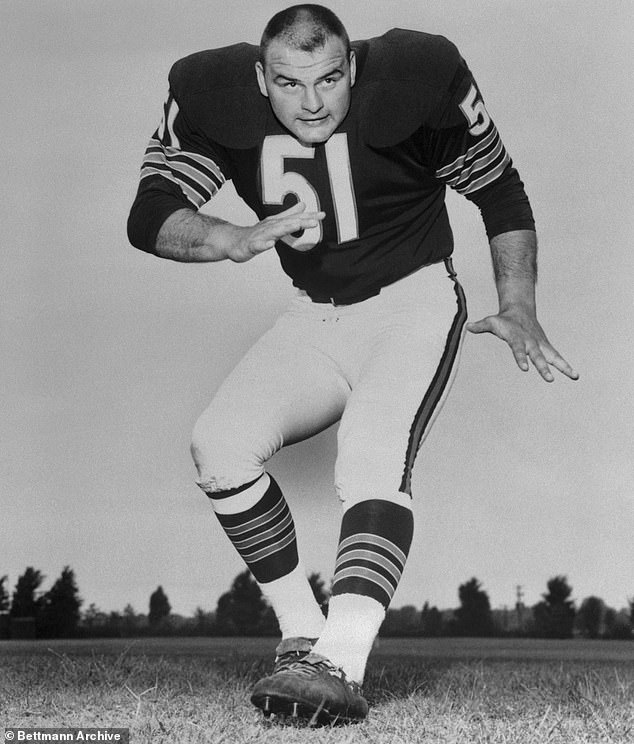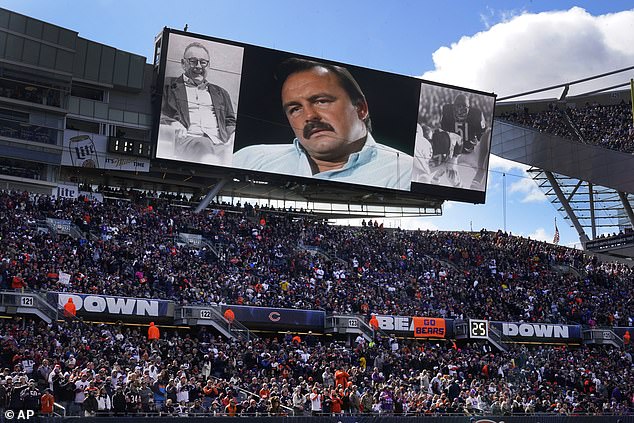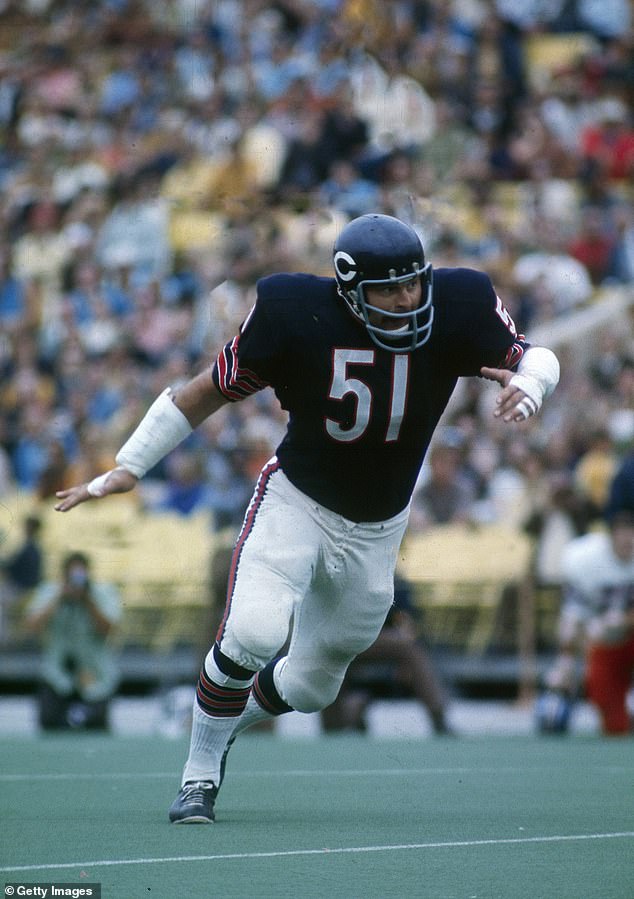REVEALED: Legendary Chicago Bears linebacker Dick Butkus died from a stroke and also suffered from hardening of his arteries, according to newly released death certificate
Dick Butkus died of a stroke on October 5, according to his recently released death certificate.
The 80-year-old also struggled with high cholesterol and atherosclerosis, which is a thickening of the arteries, TMZ reports. Butkus underwent coronary artery bypass surgery in 2001.
According to a statement from the team, Butkus’ family confirmed that he died in his sleep at his home in Malibu, California.
Butkus was a first-team All-Pro five times and made the Pro Bowl in eight of his nine seasons before a knee injury forced him to retire at age 31. He was the ultimate Monster of the Midway and was elected to the Pro Football Hall of Fame in 1979, his first year of eligibility. He is still considered one of the greatest defensive players in the history of the league.
“Dick Butkus was a fierce and passionate competitor who helped define the linebacker position as one of the NFL’s all-time greats. “Dick’s intuition, toughness and athleticism made him the model linebacker whose name will forever be associated with the position and the Chicago Bears,” NFL Commissioner Roger Goodell said in a statement. “We also remember Dick as a long-time advocate for former players and players at all levels of the game.”
Dick Butkus died of a stroke on October 5, according to his recently released death certificate

Butkus was a first-team All-Pro five times and made the Pro Bowl in eight of his nine seasons
A moment of silence was held in Butkus’ honor before the Bears played the Washington Commanders on Thursday night.
Trading on his image as the toughest guy in the room, Butkus enjoyed a long second career as a sports broadcaster, actor in films and TV series, and an in-demand pitcher for products ranging from antifreeze to beer. Whether the script called for comedy or drama, Butkus usually resorted to playing himself, often with his gruff exterior masking a softer side.
“I would never want to hurt anyone on purpose,” Butkus replied ironically when asked about his reputation on the field. “Unless it was, you know, important… like a league game or something.”
Butkus was the rare professional athlete who played close to home his entire career. He was a star linebacker, fullback and kicker at Chicago Vocational High who later went on to play at the University of Illinois. Born on December 9, 1942, the youngest of eight children, he grew up on the city’s South Side as a fan of the Chicago Cardinals, the Bears’ crosstown rivals.
But after being drafted in the first round in 1965 by both the Bears and the Denver Broncos (then a member of the now-defunct American Football League), Butkus opted to stay in Chicago and play for NFL founder and coach George Halas. The Bears also added future Hall of Famer Gale Sayers to the roster that year with another first-round pick.

The Chicago Bears will honor Dick Butkus during a game against the rival Vikings on October 15
“He was the son of Chicago,” Bears chairman George McCaskey, Halas’ grandson, said in a statement. “He radiated what our great city stands for and, not coincidentally, what George Halas was looking for in a player: toughness, smarts, instinct, passion and leadership. He refused to accept anything less than the best of himself or his teammates.”
Butkus inherited the middle linebacker job from Bill George, a Hall of Famer who popularized the position in the NFL. In 1954, George abandoned his three-point stance in the middle of the defensive line and started each play a few steps away, a vantage point that allowed him to watch the plays unfold and then race for the ball.
Butkus, however, brought speed, agility and a scorched earth attitude to the job that his predecessors could only imagine. He intercepted five passes, recovered six fumbles and was unofficially credited with forcing six more in his rookie year, topping it all off with the first of eight consecutive Pro Bowl appearances. But his reputation as a disruptor extended far beyond his ability to take football away.

Butkus hit runners high, wrapped them up and drove them to the ground like a rag doll
Butkus hit runners high, wrapped them up and drove them to the ground like a rag doll. Playboy magazine once described him as “the meanest, angriest, toughest, nastiest” player in the NFL and an “animal, a wild, inhuman one.” Such descriptions never sat well with Butkus. But they were also difficult to argue with.
Several opponents claimed Butkus had stabbed them in the face or bit them in stick-ups, and he acknowledged that during warm-ups “I would make things up to make me mad.” When the Detroit Lions unveiled an I formation against the Bears at the old Tigers Stadium, Butkus knocked every member of the “I” — the center, the quarterback, the fullback and the halfback — out of the game.
And he didn’t always stop there. Several times Butkus collided with ball carriers far beyond the sideline. More than once he chased them down racetracks around the field and even into the stands.
“Just hitting people wasn’t good enough,” teammate Ed O’Bradovich said. “He liked to crush people.”
Despite these efforts, the Bears lost far more games than they won during his tenure, going 48-74-4. Butkus struggled with tendon problems that started in high school, suffered a serious injury to his right knee during the 1970 season and underwent preventative surgery before the following season. He considered a second operation after being sidelined for nine games in the 1973 season.
